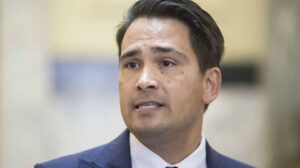There are several reasons why Three Waters should not proceed and must be halted. I will discuss two of these reasons by summarising two articles from different sides of the political divide, that highlight how this is happening in front of us.
Firstly, submissions on Three Waters have now been presented to parliament. The Taxpayers’ Union hand delivered 68,661 opposing submissions (40 boxes) to government, as they changed the rules on emailing submissions, the National Party received another 15,000 opposing submissions, and there were also many independent submissions made. Furthermore, 8,634 of the 68,661 submissions made via the Taxpayers’ Union, requested to be heard in person. This would take the Select Committee, sitting full time, 18 weeks to hear the submitters, assuming five minutes per submission. As the Taxpayers’ Union described it, “It is an extraordinary response and one that emphatically tells the Government that New Zealanders oppose these expensive and undemocratic “reforms”.
Local Government NZ (LGNZ) banned the Taxpayers’ Union from their conference, which funnily enough, is part funded by taxpayers. LGNZ also released a hybrid, unworkable and still undemocratic Two Waters proposal.
When considering how co-governance and the Treaty relate to Three Waters, Nanaia Mahuta and Labour are using this reform to undermine democracy and the Treaty of Waitangi by stealth.
Richard Prebble, of the right, recently wrote why Three Waters is an attack on democracy. He outlined how Whina Cooper, with whom he dealt with on treaty settlements, had no time for radical Māori. He also referred to Sir Apirana Ngata, who wrote about the treaty. He was born in 1874 and would have known some of the chiefs who signed the treaty. Prebble asserts that Ngata “would reject this Government’s radical revisionist version of the Treaty”.
Prebble believes this is important because the government is undertaking the greatest constitutional change since 1840. Those who challenge or question this are called racist. The Māori Party response to such questions is for us to buy a one-way ticket to Australia. This is disturbing rhetoric from a political party.
New Zealand has been a liberal democracy since the British parliament passed the Constitution Act in 1852. Individual rights are protected, the rule of law applies and one person one vote is a cornerstone of our liberal democracy. This government and especially radical Māori’s like Mahuta and the Māori Party, want to change this. Labour’s Tamati Coffey tried to change the rules for the Rotorua District Council elections, to give Māori 60% of the vote when they only represented 22% of the constituents. The same applies to Three Waters, where Māori will have control of 50% of our water resources and veto rights in the guise of co-governance.
A liberal democracy is totally incompatible with a co-governance tribal model run by powerful Iwi. As previously stated by Chris Trotter, this will simply lead to trouble. There can only be one winner and it will not be democracy, the rule of law, or one person one vote. Labour’s Willie Jackson states that democracy is changing, claiming that Māori and the government want to replace democracy with an Iwi based tribal system to override democracy.
Thus, as Prebble states, “taking the concept of co-governance and applying it to assets which Iwi have no claim over is the confiscation of property. It is ratepayers – Māori and non-Māori – who paid for the pipes, dams, stormwater drains and sewage plants.
“When this happens, we will have set up in New Zealand a system of apartheid, defined by the Oxford Dictionary “as a policy or system of segregation or discrimination on grounds of race”. Apartheid was wrong in South Africa. It will be wrong in New Zealand.
“The vast majority of New Zealanders, Māori and non-Māori, do not want to be co-governed by a self-selected Māori elite. We want to live in a liberal democracy where every vote is equal.
“Co-government is Labour’s agenda. They have the Greens’ support. The Māori Party has made it clear that should they get the balance of power it is their programme”.
On the opposite side of the political spectrum is Chris Trotter. He wrote an interesting article on Dame Salmond, a prominent Māori. Her heresy was to challenge the government’s co-governance programme. “…far from representing a fulfilment of the Treaty, are in fact a direct repudiation of it. Not only that (although that is more than enough!), Salmond is also declaring the very notion of a partnership between Māori and Pakeha to be inherently racist. To the utter consternation of the promoters and defenders of co-governance, Salmond is insisting that the whole concept of race is both scientifically and morally disreputable.
“Her interpretation of the Treaty as a document that speaks to and for everyone who lives here, undercuts the entire intellectual case for co-governance. Te Tiriti o Waitangi’s spirit is democratic and gloriously colour-blind. It was not written for, or signed on behalf of, a clique of aristocratic rulers who, like the Scottish lairds of the same period, believed themselves to have the right to replace their people with more profitable ventures. It was written to secure the future of “all the ordinary people of New Zealand” (Chris Trotter, 21 July 2022).
How does this relate directly to Three Waters? Graham Adams on the Platform summarises this well. “The boards governing the Water Services Entities will need to not only have competence in the delivery of infrastructure in their role as an “independent., skills-based board”. They will also need to, “collectively, have knowledge of, and experience and expertise in relation to… mana whenua, mātauranga, tikanga, and te ao Māori”.
“This prescription may seem unremarkable enough at first glance but if anyone thinks such priestly knowledge will be available to all prospective non-Māori board members who are willing to learn about it, they are sorely mistaken.
“Three Waters is a giant stitch-up in which assets that have been paid for by generations of taxpayers and ratepayers — Māori and non-Māori — will be effectively placed under iwi control.
“As Jason Smith puts it: “Having worked in the engine room for the Three Waters reforms, it’s clear to me they are a Trojan Horse for ending of democratic rights. Major constitutional reform wrapped up in a set of busted pipes.”
Thus, Three Waters is the embodiment of a racist policy, aimed to undermine the principles of democracy and at the same time, move 50% of the vast water assets that belong to all people of New Zealand, into the hands of powerful elite Māori “ownership”. It is theft by stealth and racist, and totally in defiance of the Treaty of Waitangi. It has the potential to end democracy as we know it.

